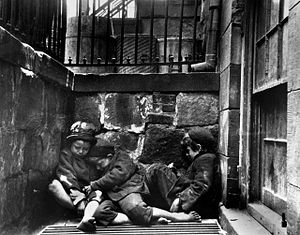Watoto wa mitaani


Watoto wa mitaani ni watoto ambao wamekosa makazi bora, malazi na mavazi kutoka kwa wazazi au walezi wao. Jambo hilo limesababisha kutokuwa na mahali maalumu pa kuishi.
Idadi yao duniani hukadiriwa kuwa milioni mia moja hivi.
Sababu
[hariri | hariri chanzo]Kuwa mtoto wa mitaani husababishwa na ugomvi wa wazazi ambao hatimaye hutengana; hapo mtoto hukosa haki na mahitaji yake ya msingi. Mtoto huona bora akaishi mtaani ili aweze kufanya japo kazi ndogo aweze kupata mahitaji yake.
Pengine hutokana na vifo vya wazazi wote wawili, ambapo baadhi yao hutengwa na ndugu na kukosa mahali pa kwenda.
Kuna wakati watoto hao hukosa chakula, hivyo huona bora aibe ili apate kula. Wengine huingia kwenye makundi ya uuzaji wa madawa ya kulevya na ujambazi.
Majukumu
[hariri | hariri chanzo]Jamii inatakiwa ichukue jukumu la kuwasaidia watoto haO ili kuwaepusha na mambo hayo. Sisi sote kama jamii tunatakiwa tuliangalie suala hilo kwa umakini kwa usaidizi wa serikali; jukumu hili ni la kila mtu.
Ingawa serikali nyingine zimetekeleza mipango ya kukabiliana na matatizo ya watoto wa mitaani, mpaka sasa suluhisho la jumla linahusisha kuwaweka katika makazi ya mayatima, nyumba za vijana, au taasisi za marekebisho.
Huko Kolombia, serikali imejaribu kutekeleza mipango ya kuweka watoto hawa katika nyumba zinazoendeshwa na serikali, lakini jitihada hizo zimeshindwa kwa kiasi kikubwa, na watoto wa mitaani wamekuwa kundi la watu walioathiriwa na ukatili wa Polisi na Usalama wa Taifa, kwa sababu, wanadhani ni watumiaji wa madawa ya kulevya na wahalifu.
Katika Australia, majibu ya msingi kwa wasio na makazi ni Programu ya Usaidizi wa Makazi ya Usaidizi (SAAP). Mpango huo ni mdogo kwa ufanisi wake. Inakadiriwa moja kati ya vijana wawili ambao wanatafuta kitanda kutoka SAAP hugeuzwa kwa sababu huduma zimejaa.
Jitihada za kufaa zaidi zimefanywa na serikali mbalimbali kusaidia au kushirikiana na mashirika yasiyo ya serikali.
Marejeo
[hariri | hariri chanzo]- Ansell, Nicola (2005). Children, Youth, and Development. Routledge perspectives on development. Psychology Press. ISBN 9780415287692.
{{cite book}}: Invalid|ref=harv(help) - Ball, Alan M. (1994). And Now My Soul is Hardened: Abandoned Children in Soviet Russia, 1918-1930. University of California Press. ISBN 978-0-520-20694-6.
{{cite book}}: Invalid|ref=harv(help) - Boswell, John (1988). The Kindness of Strangers: the Abandonment of Children in Western Europe from Late Antiquity to the Renaissance. Chicago, IL: University of Chicago Press. ISBN 9780226067124.
{{cite book}}: Invalid|ref=harv(help) - Brown, B. Bradford; Larson, Reed W.; Saraswathi, T. S., whr. (2002). The World's Youth: Adolescence in Eight Regions of the Globe. Cambridge University Press. doi:10.1017/CBO9780511613814.005. ISBN 9780521809108.
{{cite book}}: Invalid|ref=harv(help) - Cottrell-Boyce, Joe (2010). "The role of solvents in the lives of Kenyan street children: an ethnographic perspective" (PDF). African Journal of Drug and Alcohol Studies. 9 (2): 93–102. doi:10.4314/ajdas.v9i2.64142. Ilihifadhiwa kwenye nyaraka kutoka chanzo (PDF) mnamo 2016-04-20. Iliwekwa mnamo 2017-07-16.
{{cite journal}}: Invalid|ref=harv(help); Unknown parameter|dead-url=ignored (|url-status=suggested) (help) - Ennew, Judith; Milne, Brian (1990). The Next Generation: Lives of Third World Children. Philadelphia, PA: New Society.
{{cite book}}: Invalid|ref=harv(help) - Flowers, R. Barri (2010). Street Kids: the Lives of Runaway and Thrownaway Teens. Jefferson, NC: McFarland. ISBN 9780786456635.
{{cite book}}: Invalid|ref=harv(help) - Green, Duncan (1998). Hidden Lives: Voices of Children in Latin America and the Caribbean. London: Bloomsbury. ISBN 9780304336883.
{{cite book}}: Invalid|ref=harv(help) - Hecht, Thomas (1998). At Home in the Street: Street Children of Northeast Brazil. Cambridge University Press. ISBN 9780521598699.
{{cite book}}: Invalid|ref=harv(help) - Kirk, Robin (1994). "Bogotá". Katika Cynthia Arnson (mhr.). Generation Under Fire: Children and Violence in Colombia. Human Rights Watch. ISBN 9781564321442.
{{cite book}}: External link in|chapterurl=|ref=harv(help); Unknown parameter|chapterurl=ignored (|chapter-url=suggested) (help) - Scanlon, Thomas J.; Tomkins, Andrew; Lynch, Margaret A.; Scanlon, Francesca (1998). "Street children in Latin America". British Medical Journal. 316 (7144): 1596–1600. doi:10.1136/bmj.316.7144.1596. PMC 1113205. PMID 9596604.
{{cite journal}}: Invalid|ref=harv(help) - Verma, Suman; Saraswathi, T. S. (2002). "Adolescence in India: street urchins or Silicon Valley millionaires?". Katika B. Bradford Brown; Reed W. Larson; T. S. Saraswathi (whr.). The World's Youth: Adolescence in Eight Regions of the Globe. Cambridge University Press. ku. 105–140. doi:10.1017/CBO9780511613814.005. ISBN 9780521809108.
{{cite book}}: Invalid|ref=harv(help)
Viungo vya nje
[hariri | hariri chanzo]- Street Child: is a UK charity, that aims to create educational opportunity for some of the most vulnerable children in West Africa.
- The Hope Foundation: Offering protection, education and healthcare to street children in Kolkata, India
- Street Children in Gimbi, Ethiopia, including documentary of a specific boy
- Streetconnect.org Ilihifadhiwa 20 Aprili 2010 kwenye Wayback Machine.: A clearing house of information for and about homeless youth
- Hummingbird: a documentary about two NGOs in Brazil that work with street kids
- The Goodman Project Ilihifadhiwa 19 Juni 2017 kwenye Wayback Machine.: A foundation set up to help the street kids in India and Asia
- Street Children: Article on the Children's Rights Portal
| Makala bado ni mbegu. Unaweza kuisaidia Wikipedia kwa kuongezea habari. |

